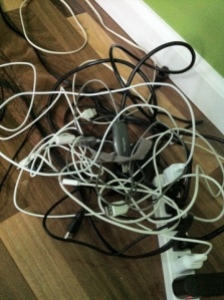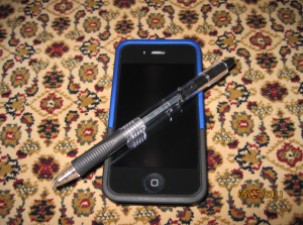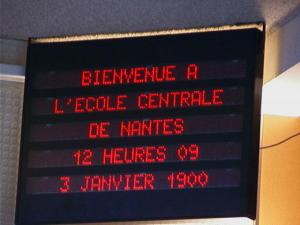I came across an article the other day, “When Roommates Were Random,” that discussed the recent trend of finding one’s college roommate on the Internet. Apparently, the moment that high school seniors get accepted to their school of choice, or safety school if they harbored illusions about their own talents, they go onto Facebook and websites dedicated to finding the perfect college roommates.
So now an incoming freshman can match up with another freshman who is not only the same level of neatness, but also someone who keeps the same study hours, who likes the same color schemes, who feels the same way about politics, religion, and the Star Wars prequels. If you are going to be living on campus, you can find someone who is so much like you that it is well-past midterms when you realize that the reason your roommate gets up and goes to bed at the same exact you do is because you are looking into a mirror.
The housing application I filled out before freshman year asked me two questions: Did I smoke, and was I neat? I truthfully answered “no” to both questions.
“Great,” I thought, “now they’ll definitely match me up with someone who is just like me.”
The next thing I knew I was standing in front of the dorms on the far side of campus, my new home for the next nine months assuming I didn’t flunk out first semester, which television and movies had told me could happen. My parents stood beside me, wondering if I was going to be as messy at college as I was at home, and when my roommate was going to show up. The only thing we knew about him was his name, that he was from Kansas, and that he was getting to campus a few days before me..
A young man who looked exactly my age rode up on a bicycle. He had brown hair and a healthy look about him. A very All-American look. He braked near a bike rack, and I walked over to him and introduced myself. As we got to know each other, I learned that he ran cross country, and that he ran ten miles at practice every day. He learned that I had once bought a BB gun to shoot squirrels in my backyard. Freshman year began, and with cross country practice, the evidence I generally ever saw of my roommate was the growing pile of trash in his corner of the room.
We had been given a small gray wastebasket upon arrival where we could toss our rough drafts of papers or literature from campus groups promising to make us activists. These wastebasket could be emptied in a larger bin on the floor, but it was all the way at the end of the hallway, and generally I would tolerate a bit more garbage in my life rather than leave my desk and computer and Internet, which I had never used before college, and which, I was discovering, had a lot of interesting things on it. Since my roommate ran ten or twelve miles a day I figured he would be a lot more comfortable with getting out of his chair than I was, but he too didn’t seem much in a rush to empty his wastebasket.
I don’t know when exactly the garbage in my wastebasket began to peek out over the rim like an iceberg in the North Atlantic. One day I noticed that I wasn’t so much tossing the garbage in the wastebasket as carefully balancing it atop older layers of garbage. And that I had been doing so for some time. I realized what I was doing and was disgusted with myself, and reached a point where I was either going to change direction and throw out the trash, or press on into unchartered territory. Then I looked over at my roommate and saw that he was doing the same thing, but in sneakers and wrist bands. “If he’s not doing it, then I’m not doing it either,” I said. I wasn’t about to upset the karmic applecart in the room.
By Halloween our garbage piles had reached ghoulish proportions. Mine was already beyond the top of my computer monitor, and by merely scanning the midsection of the mound I could review the last few weeks of my life. It was a kind of journal, and by turning my head I could do the same with my roommate’s garbage.
I imagined that one day anthropologists would use the empty cans of Dr. Pepper to date my roommate and I and make groundbreaking conclusions about how males aged 18-to-21 lived at the turn of the second millennium. They would note the matching sets of Nutty Bar wrappers at isolevels of garbage, and conclude that humans were much more do the same thing and conclude that my roommate and I had been eating Nutty Bars at around the same time (assuming a constant rate of Nutty Bar consumption), and the discovery of only one box of Nutty Bars, peeking out from a sub-pile of orientation materials and promissory notes, would lead them to conclude that we had shared the Nutty Bars, giving birth to a new theory of altruism between males aged 18-to-21. As I let a crumpled napkin flutter down atop the pile, I swelled with pride at my contribution to science.
By Thanksgiving our efforts at balancing in the air were no longer having an effect, and the goal had tacitly become one of containment on the ground. Our respective monuments had reached a critical mass where the peak could go no higher, and any new additions tumbled down the mountainside to a final resting place by my feet and chair legs. The ground pile, being shorter, spread in area more quickly. It was ivy spreading across the floor, around our chair legs, into the bedrooms. I considered entering it in a student-run art show, but I let the entry form get buried under a family of Little Debbie’s wrappers.
We were too superstitious to clean up the garbage during finals. That December morning we were both returning to our respective homes for the colossal holiday break, we stood before our respective piles, holding our luggage, and I could tell my roommate was thinking the same thing I was: Is it sanitary to let this garbage dump sit around all break? For a moment we almost did something about it. But I think we realized that the thing that had brought us together in the truest tradition of dormitory life—a world-class indifference to filth—we wanted to continue into spring semester.
So we left the room as it was, shook hands, and went off to spend a few weeks in the care of people who would pick up after us.







